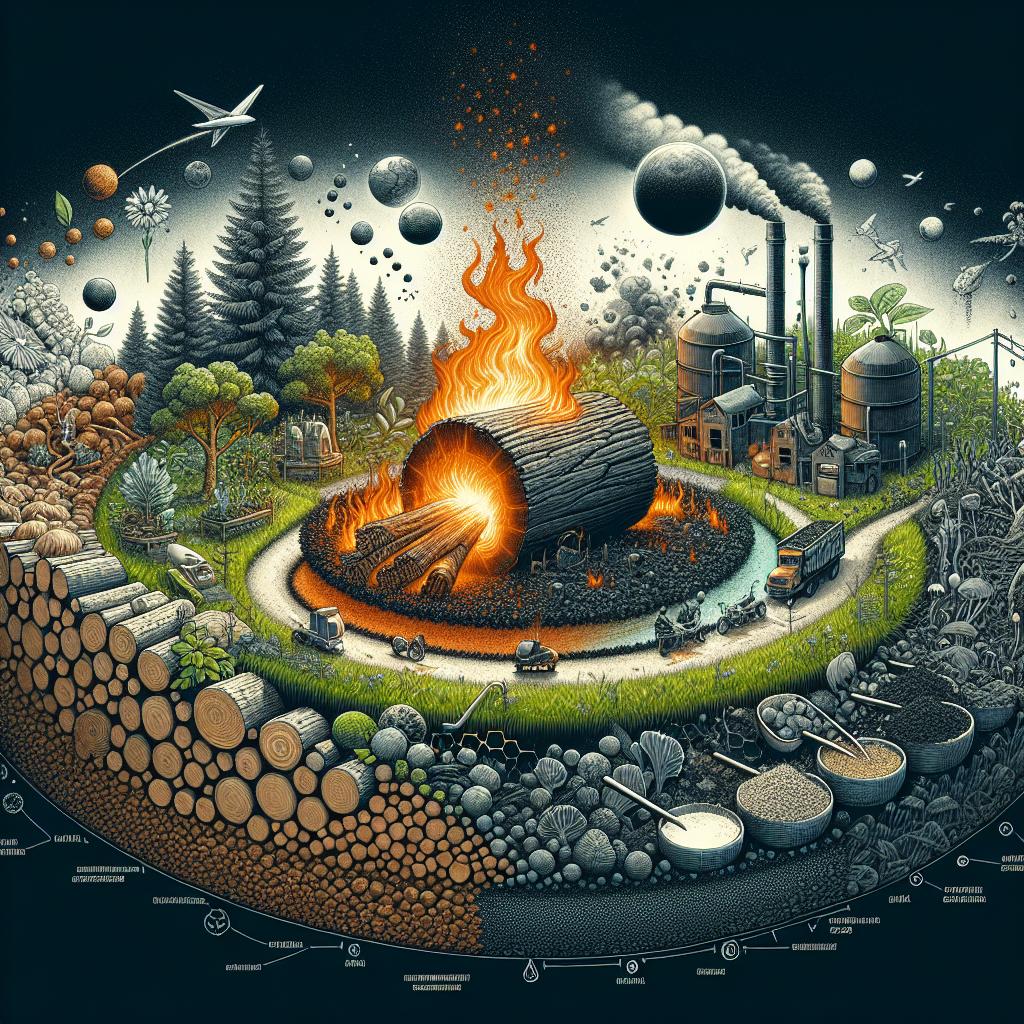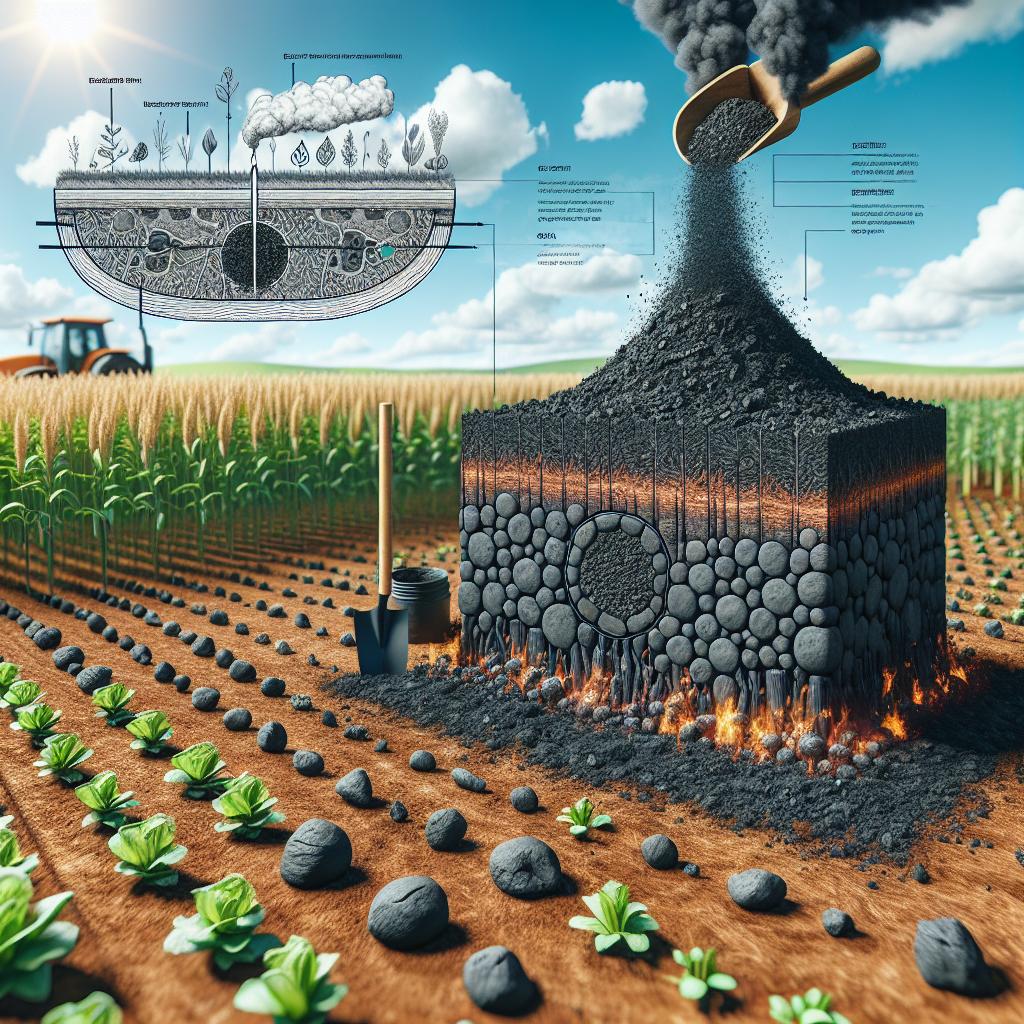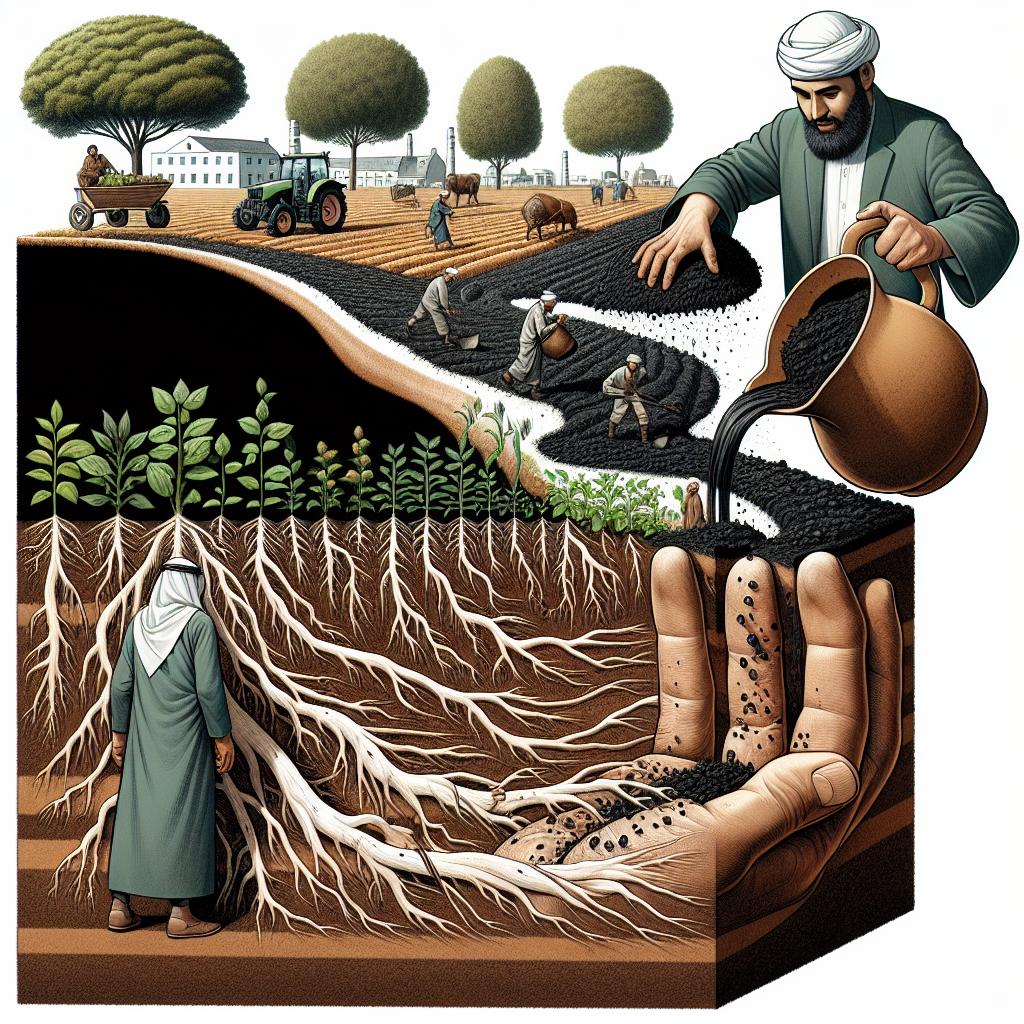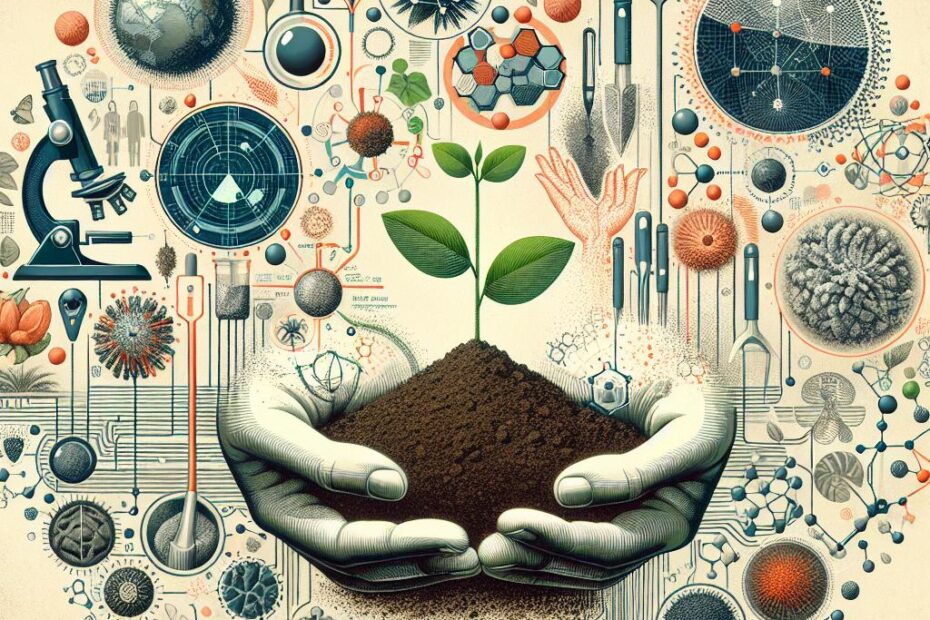Unleashing the secrets of ancient terraforming techniques, biochar whispers its story through the centuries, captivating scientists and farmers alike. Stepping into the world of soil enrichment, this organic alchemist brings forth an extraordinary transformation. But what does this mysterious substance truly do for soil? Join us on a journey where we unravel the enigmatic powers of biochar. In this article, we explore the fantastical realm of biochar’s influence, empowering soil to flourish with newfound vitality. Prepare to be enchanted by the wonders that lie beneath the earth’s surface as we delve into the realm of biochar, where science meets magic.

Biochar: Unveiling the Secrets of its Soil-Boosting Powers
When talking about soil improvement, biochar deserves a special mention. This intriguing substance holds the key to unlocking the secrets of soil-boosting powers. Made from organic waste that undergoes pyrolysis, a low-oxygen burning process, biochar transforms into a stable form of carbon that can endure for thousands of years in the soil.
So, what exactly does biochar do for soil?
First and foremost, this magical substance enhances soil fertility. It provides a porous environment that enables beneficial microorganisms to thrive, contributing to the richness of the soil’s microbiome. By retaining moisture, biochar helps prevent drought stress on plants, improving the resilience of crops and aiding in water conservation. Moreover, its unique structure aids in the retention of essential nutrients, preventing them from leaching away, and making them more available to plants when needed. In short, biochar acts as a natural fertilizer, enriching the soil and creating a nurturing environment for plants.
Secondly, biochar plays a vital role in mitigating climate change. As biochar is created through the carbonization of organic matter, it locks in carbon that would otherwise be released into the atmosphere as greenhouse gases. This process helps to reduce carbon dioxide levels, making biochar an effective carbon sink. Additionally, since biochar decomposes extremely slowly, it prevents the release of carbon back into the atmosphere over extended periods. This dual benefit of carbon storage and emission reduction makes biochar an eco-friendly option for soil improvement.
With its ability to enhance fertility, conserve water, retain nutrients, sequester carbon, and decrease greenhouse gas emissions, biochar proves to be a valuable asset for sustainable agriculture and soil management. So, the next time you dig into the world of soil improvement, consider the secrets that biochar reveals and how it can help unlock the full potential of your garden or farm.

Unlocking the Magic: How Biochar Enhances Soil Health
When it comes to soil health, biochar is like a magician waving its wand, conjuring up a world of benefits for our beloved earth. Made from organic waste such as agricultural byproducts and wood chips, biochar is a unique form of charcoal that holds the power to revolutionize the way we nurture our soils. So, what exactly does biochar do for soil? Let’s dive into its enchanting qualities:
1. Retains Moisture
The remarkable sponge-like structure of biochar allows it to retain moisture like no other. When added to soil, it absorbs water and holds onto it, creating a reservoir that plants can tap into during dry spells. This superpower not only reduces the need for constant watering but also helps to combat drought conditions that threaten crop yield and plant survival.
2. Provides Nutrient Heaven
Filled with tiny cavities and pores, biochar acts as a heaven for essential nutrients. Its porous nature traps and slowly releases nutrients, such as nitrogen, phosphorus, and potassium, providing a steady supply to plants over time. This not only enhances soil fertility but also minimizes nutrient runoff, preventing water pollution and safeguarding our precious ecosystems.
With its ability to retain moisture and provide a nutrient paradise, biochar proves to be a game-changer in sustaining healthy soils. By unlocking the magic of biochar, we unlock the potential to nurture abundant crops, conserve water, and safeguard the environment we call home.

Biochar’s Role in Promoting Nutrient Retention for Plant Growth
Biochar, a form of charcoal produced through the conversion of organic matter, plays a crucial role in promoting nutrient retention and enhancing plant growth in soil. This carbon-rich substance has a multitude of benefits that contribute to the overall health and fertility of the soil, making it a valuable tool for farmers and gardeners alike. Let’s explore how biochar positively influences nutrient retention and how it can be utilized to maximize plant growth.
Improves nutrient availability:
One of the key benefits of biochar is its ability to enhance the availability of essential nutrients within the soil. By acting as a sponge, biochar absorbs and holds onto nutrients, preventing them from being washed away by rain or irrigation. This process, known as cation exchange capacity (CEC), allows plants to efficiently access the stored nutrients when needed, ensuring optimal growth and development.
Enhances microbial activity:
Biochar also creates a favorable environment for beneficial soil microorganisms. Its porous structure provides a habitat for beneficial bacteria and fungi, promoting their growth and activity. These microorganisms play a vital role in nutrient cycling, breaking down organic matter and converting it into forms that plants can easily absorb. Additionally, biochar helps retain moisture in the soil, providing a consistent water supply for the microbial community, further enhancing their activity.
| Nutrient Retention | Enhanced Availability |
| Promotes Soil Fertility | Improved Plant Growth |

Enhancing Soil Structure with Biochar: The Ultimate Natural Solution
Biochar, the transformative substance that has taken the agricultural world by storm, offers incredible benefits for enhancing soil structure. This natural solution, made from bio-waste materials such as wood chips or agricultural residue, works wonders in improving soil fertility and overall plant growth. Let’s explore some of the remarkable ways biochar contributes to soil enhancement.
Promotes Water Retention:
The porous nature of biochar allows it to act as a sponge in the soil, retaining water and preventing excess runoff. Unlike synthetic materials, biochar holds water in its tiny pores, ensuring that plants have access to sufficient moisture even in dry periods. This water retention property not only aids plants during periods of drought but also reduces the need for frequent irrigation, helping conserve water resources.
Enhances Nutrient Retention:
Biochar has an impressive ability to attract and retain nutrients in the soil. Its porous structure acts as a magnet, capturing essential elements like nitrogen, phosphorus, and potassium, preventing them from being washed away by heavy rainfall or leached into groundwater. This nutrient retention property of biochar not only ensures high availability of vital nutrients for plants but also reduces fertilizer runoff and associated environmental pollution.
Improves Soil Microbial Activity:
The introduction of biochar into the soil creates a hospitable environment for beneficial microorganisms to thrive. These microorganisms enhance soil health by breaking down organic matter and releasing nutrients in a form plants can readily absorb. Additionally, the stable carbon in biochar serves as a long-term food source for microorganisms, sustaining their population and improving overall soil fertility.
| Benefits of Biochar for Soil: | |
|---|---|
| Promotes water retention | ✔️ |
| Enhances nutrient retention | ✔️ |
| Improves soil microbial activity | ✔️ |
Conclusion:
In conclusion, biochar presents itself as an ultimate natural solution for enhancing soil structure. Its ability to promote water retention, enhance nutrient availability, and improve soil microbial activity makes it an invaluable asset for sustainable farming practices. By incorporating biochar into agricultural systems, farmers can reap the benefits of healthier soils, increased crop yields, and reduced environmental impacts. With biochar, we have a remarkable tool in our hands to cultivate a greener future.

A Closer Look at Biochar’s Ability to Increase Water Holding Capacity
When it comes to improving soil health and enhancing crop growth, biochar has emerged as a fascinating solution. Its ability to increase water holding capacity is a particularly noteworthy trait that has garnered significant attention from agricultural experts.
So, what exactly does biochar do for soil? Let’s delve into the details:
- Retains Moisture: One of the key benefits of using biochar in soil is its impressive water retention capabilities. Due to its porous structure and high surface area, biochar acts like a sponge, absorbing water and retaining it for a longer period. This increased water holding capacity provides a buffer during dry spells, reducing the risk of drought stress for plants.
- Improves Irrigation Efficiency: By enhancing the ability of soil to hold water, biochar helps optimize irrigation practices. It reduces water runoff and minimizes evaporation, ensuring a more efficient use of water resources. This can ultimately lead to cost savings and a more sustainable approach to agriculture.
Now, let’s take a closer look at the impact of biochar on soil water holding capacity using a comparative analysis:
| Soil Type | Water Holding Capacity without Biochar (in %) | Water Holding Capacity with Biochar (in %) |
|---|---|---|
| Loamy Soil | 35% | 45% |
| Sandy Soil | 10% | 20% |
| Clayey Soil | 45% | 55% |
As seen in the table, incorporating biochar into various soil types leads to a significant increase in their water holding capacity. This demonstrates the potential of biochar to combat issues related to water scarcity and improve overall soil health.

Biochar’s Long-lasting Impact on Soil Fertility and Carbon Sequestration
Biochar, a form of charcoal made from organic waste, has gained increasing attention for its long-lasting impact on soil fertility and carbon sequestration. When incorporated into the soil, biochar becomes a valuable tool in improving soil health and sustainability.
One of the key benefits of biochar is its ability to enhance soil fertility. Due to its porous structure, biochar acts as a sponge, retaining water and essential nutrients in the soil, making them readily available for plant uptake. By increasing water and nutrient retention, biochar helps to improve soil moisture levels and ensures that plants have access to the necessary resources for growth and development. Additionally, biochar also increases the cation exchange capacity of the soil, promoting nutrient availability and reducing nutrient leaching. This results in healthier and more productive crops, making biochar a valuable asset for farmers and gardeners alike.
Another significant advantage of biochar is its role in carbon sequestration. When applied to the soil, biochar acts as a stable carbon sink, locking away carbon for thousands of years. This can contribute to mitigating climate change by reducing greenhouse gas emissions. By sequestering carbon in the soil, biochar not only helps to reduce atmospheric carbon dioxide levels but also enhances soil quality and fertility. The long-lasting nature of biochar as a carbon sink makes it an attractive option for sustainable soil management practices, offering a win-win solution for both agriculture and the environment.
In conclusion, makes it a powerful tool for sustainable agriculture and climate change mitigation. Its ability to improve soil moisture levels, nutrient availability, and carbon storage contributes to healthier plants, more productive crops, and reduced greenhouse gas emissions. By harnessing the potential of biochar, we can work towards building a more resilient and sustainable future for our soils and the planet.
Harnessing the Potential: Biochar as a Tool for Soil Restoration
Biochar, an innovative soil amendment, has gained attention in the field of agriculture for its remarkable potential in soil restoration. With its ability to improve soil fertility, retain nutrients, and sequester carbon, biochar has become a valuable tool for sustainable farming practices.
So, what does biochar do for soil? Let’s explore its benefits:
- Enhanced Nutrient Retention: Biochar acts as a sponge, absorbing and retaining essential nutrients, preventing them from leaching out of the soil. This leads to improved nutrient availability for plants, promoting healthy growth and increased crop yields.
- Improved Soil Structure: When mixed with soil, biochar helps create a stable and porous structure. This enhances water drainage, reduces soil compaction, and increases soil aeration. As a result, roots can penetrate deeper and access nutrients and water more efficiently.
- Carbon Sequestration: Biochar is a powerful ally in the fight against climate change. By locking carbon in the soil for centuries, it helps reduce greenhouse gas emissions. This carbon sequestration ability makes biochar an effective tool for mitigating climate change while improving soil health simultaneously.
In summary, biochar offers several advantages that contribute to soil restoration, sustainable agriculture, and environmental preservation. When harnessed correctly, this ancient technique can significantly enhance soil fertility and promote long-term ecological balance.

Biochar Dos and Don’ts: Best Practices for Optimal Soil Incorporation
Biochar, a type of charcoal produced from organic matter, has gained considerable attention as a soil amendment in recent years. Its numerous benefits make it a popular choice among gardeners and farmers alike. When incorporated properly, biochar can significantly improve soil quality, enhance nutrient retention, and promote the overall health of plants. However, it is crucial to follow some dos and don’ts to ensure optimal results.
Dos:
- Choose high-quality biochar: Make sure to select biochar that has gone through a proper pyrolysis process, resulting in a stable and effective product.
- Prep your soil: Before applying biochar, prepare your soil by removing any debris, weeds, or rocks. This will allow for better incorporation and maximize its benefits.
- Use appropriate quantity: Follow the recommended application rate for biochar, which typically ranges from 5-10% of the total soil volume. Using too little biochar may not yield noticeable results, while excessive amounts can hinder plant growth.
- Combine with compost: Mixing biochar with compost can enhance its effectiveness by further improving soil structure and nutrient availability. This combination creates a nutrient-rich environment for plants to thrive.
Don’ts:
- Don’t apply raw biochar: Raw biochar should not be directly applied to the soil without first undergoing a conditioning period. This is because raw biochar can initially deplete soil nutrients due to its high adsorption capacity.
- Avoid using biochar in waterlogged soils: Biochar works best in well-drained soils. Using it in waterlogged or poorly draining soils can lead to anaerobic conditions, hindering root development and potentially causing plant stress.
- Don’t rely solely on biochar: While biochar offers numerous benefits, it is not a substitute for other soil improvement practices. It is essential to maintain a balance by incorporating other organic matter, such as compost and mulch, to optimize soil health and fertility.
- Avoid excessive tilling: Excessive mechanical tilling can disrupt the stability and structure of biochar-amended soil. Minimize tilling to reduce the chances of biochar being diluted or displaced.

Maximizing Sustainable Agriculture: Biochar as a Key to Increased Crop Yields
When it comes to sustainable agriculture, the transformative powers of biochar are undeniable. Biochar, a type of charcoal produced by heating biomass in a low-oxygen environment, has been gaining recognition as a key ingredient in increasing crop yields and improving overall soil health. But what exactly does biochar do for soil?
1. Enhanced Nutrient Retention: Biochar acts as a sponge for nutrients, helping to retain essential elements such as nitrogen, phosphorus, and potassium in the soil. This prevents them from leaching away, ensuring that plants have a steady supply of nutrients for optimal growth.
2. Improved Soil Structure: The porous nature of biochar enables better water and air circulation within the soil. This aids in root development and fosters beneficial microbial activity. The improved soil structure also reduces soil compaction, allowing plant roots to penetrate deeper and access more nutrients. Additionally, the presence of biochar enhances soil aggregation, making it more resistant to erosion and promoting long-term soil fertility.
Q&A
Q: What is this mysterious thing called biochar?
A: Ah, biochar! Prepare yourself for a journey into the realm of enchanted soil fertility! Biochar is a type of charcoal that is created by burning organic waste. But this isn’t your average charcoal; it has magical qualities that bring life back to tired and depleted soil.
Q: Why is biochar considered magical?
A: Well, let me assure you that biochar is indeed magical! When mixed into soil, biochar acts as a godsend for both plants and the environment. It locks away carbon for hundreds, if not thousands of years, mitigating the effects of climate change. But that’s not all – it also improves soil health, enhances plant growth, and helps to conserve water.
Q: How exactly does biochar improve soil health?
A: Allow me to cast a spell of knowledge upon you! Biochar works its magic by improving soil structure, promoting water retention, and increasing nutrient availability. It acts like a sponge, absorbing and retaining water and essential nutrients, preventing them from being washed away. It also provides a cozy shelter for beneficial microbes, creating a thriving ecosystem below our feet.
Q: Can biochar really enhance plant growth?
A: Absolutely! Picture biochar as a benevolent plant nutritionist. When added to the soil, biochar creates a haven for beneficial microbes, which in turn form symbiotic relationships with plant roots. This symbiosis boosts nutrient uptake, making plants healthier, stronger, and more resistant to pests and diseases. It’s like a plant spa day!
Q: How does biochar help conserve water?
A: Ah, behold the mystical power of biochar! By efficiently retaining water within the soil, biochar reduces water runoff and evaporation, sparing us from constant watering spells. It essentially teaches the soil to become a wise water-saving wizard, making every drop count and protecting against drought conditions.
Q: Are there any other enchanting benefits of biochar?
A: Oh, you bet there are! Biochar has additional extraordinary powers, such as detoxifying contaminated soil, reducing fertilizer leaching, and even cleaning up polluted water. It also supports long-term carbon storage, fighting against the dark forces of climate change. In short, biochar is a magical solution for multiple environmental challenges.
Q: Can I make biochar myself?
A: Absolutely! Wield your own magic wand, err…I mean, create your own biochar! You can make it at home by burning organic materials like wood chips or agricultural waste in a controlled environment, such as a simple fire pit. Just remember to be safe and take precautions. Alternatively, you can also purchase biochar from specialized suppliers.
Q: Is biochar suitable for any type of soil?
A: Fear not, for biochar is adaptable to most soils! Whether you have sandy soils that don’t retain water well, or compacted clay soils that drain poorly, biochar is here to lend a helping hand. Its ability to improve soil structure and maximize nutrient availability makes it a versatile ally for various soil types.
Q: Are there any risks or drawbacks to using biochar?
A: Though biochar certainly has its magical qualities, it is essential to use caution. Applying excessive amounts may temporarily affect nutrient availability, but this can be mitigated by proper management practices. Additionally, it’s crucial to ensure the quality of the biochar you use, as poor-quality biochar might introduce harmful substances into the soil.
Q: Where can I learn more about this extraordinary soil wizardry?
A: Ah, knowledge seekers! Delve into the enchanted realm of scientific research, where countless studies have been conducted on the wonders of biochar. Numerous books, articles, and online resources are available to quench your thirst for understanding and imbue you with the wisdom of biochar’s interaction with soil and the environment. Let the learning journey begin!
Concluding Remarks
As we conclude our exploration into the captivating world of biochar and its intriguing impact on soil, it is clear that nature has bestowed upon us a truly remarkable gift. Like a silent alchemist, biochar works tirelessly beneath the surface, transforming mundane earth into a thriving haven for life. Its dark particles weave an enchanting tapestry, an organic masterpiece that entwines with the roots of plants, protecting them, nurturing them, and setting in motion a symphony of growth.
Within this charred matrix lies a realm where the dance of microbes and fungi occurs, a secret world teeming with vibrant energy and secrets waiting to be unveiled. The intricate network of porous tunnels formed by biochar becomes the bustling high street, bustling with vital nutrients and water, ensuring that no drop goes unutilized, no mineral lies idle. In its presence, soil springs to life, awakened like Sleeping Beauty from her slumber.
And what of our silent heroes, those eternally vigilant guardians of soil fertility? The resilience of biochar ensures that the delicate balance is maintained, preventing dreaded soil erosion and safeguarding essential elements from being washed away. As a force of nature, biochar embraces the role of a master conductor, blending harmoniously the symphony of organic matter, while reducing pH levels and allowing soil to breathe, like a gentle inhalation of pure life.
But perhaps the true magic of biochar lies in its ability to transcend time. With the patience of a sage, it becomes a steadfast companion, enriching soil for centuries to come. Endurance is its birthright, as biochar smiles knowingly at the mere mortals who witness its transformative power. Its legacy, etched deeply within the annals of soil history, will forever be felt by future generations who will reap the rewards of its silent presence.
So let us marvel at this humble yet extraordinary carbonaceous entity, a hero among the elements, a catalyst for the rebirth of soil fertility that can sculpt the bountiful landscapes of tomorrow. As we bid adieu to the world of biochar, remember that the allure of its mysteries will continue to captivate and inspire, urging us to delve deeper into its realm as we strive to unlock the true potential of our precious earth.
